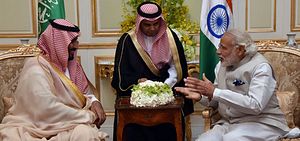Indian Prime Minister Narendra Modi arrived in Saudi Arabia for a two-day visit over the weekend, his first to the oil-rich kingdom. Modi met with King Salman bin Abdulaziz al Saud and other senior Saudi officials. Salman, who took over as king after King Abdullah bin Abdulaziz al Saud’s death early year, had previously visited India before the Modi government came to power in 2014. In Riyadh, Modi signed wide-ranging agreements on economic and security cooperation, building on the bilateral strategic partnership between the two countries that has largely been in place since the 2010 Riyadh Declaration, which offered a road map for closer ties. Modi’s visit is the first prime ministerial visit to the kingdom since Manmohan Singh, his predecessor, visited in 2010.
New Delhi’s approach toward Riyadh has long been driven by energy concerns, but shifting consumption patterns, both globally and in India, have changed this dynamic. Partially as a result of this, India’s diplomacy with the kingdom has grown more diverse and today spans a range of issues unrelated to energy. Nevertheless, as of February 2016, Saudi Arabia was India’s top crude oil supplier, providing 1.12 million barrels per day. Recently, India has diversified its import sources, importing more from Africa, for example. Despite these shifts, Modi met with Khalid A. al Falih, the head of Saudi Aramco, Saudi Arabia’s massive state oil company. According to Vikas Swarup, a spokesperson for the Indian foreign ministry, al Falih told Modi that “Aramco looks to India as its No 1 target for investment.” The joint statement issued at the conclusion of the visit noted that “Modi encouraged Saudi Aramco, SABIC, and other Saudi companies to invest in the infrastructure sector in India.”
Modi’s visit to the kingdom also saw an increased emphasis on security and counter-terrorism cooperation. On Sunday, Modi and King Salman agreed to cooperate on exchanging intelligence to prevent money laundering, organized crime, and to disrupt terrorist financing. Just days before Modi arrived in Riyadh, Saudi Arabia and the United States imposed joint sanctions targeting Lashkar-e-Taiba, the Pakistan-based anti-India terror group responsible for the 2008 Mumbai terror attacks. Modi and Salman jointly condemned terrorism. Their joint statement moreover rejected attempts “to link this universal phenomenon to any particular race, religion or culture.”
The two sides also agreed to expand their nascent defense cooperation by formalizing an intent to increase military-to-military exchanges and joint exercises. The Modi-Salman joint statement additionally stated an intent to increase “exchange of visits of ships and aircraft and supply of arms and ammunition and their joint development.” During Salman’s visit to India in 2014, then as the kingdom’s defense minister, the two countries signed an expanded defense cooperation agreement. Overall, Modi and Salman’s joint statement demonstrates a sharp increase in cooperation between India and Saudi Arabia on defense and terrorism matters. Where both issues featured as perfunctory mentions in the 2010 Riyadh declaration, the 2016 joint statement features extensive discussion of both topics.
Beyond strategic and economic issues, Modi’s visit to Saudi Arabia also focused on the large Indian diaspora living in the country. Though Modi did not hold a major event for Indians living in Saudi Arabia, he spoke with representatives of the more than 3 million Indians living in the country. On Sunday, he met with professionals at the Tata Consultancy Services’ All-Women Center in Riyadh. As Tanvi Madan wrote before Modi’s trip to Saudi Arabia at Brookings, “diaspora-related issues, including the treatment of Indian workers in-country and efforts towards Saudization that might limit employment opportunities for Indian expatriates” are often a difficult point in the Saudi-Indian bilateral relationship. To this end, the Modi-Salman joint statement recognized the “valuable role of the Indian community in Saudi Arabia and its contribution to the progress and development of both India and Saudi Arabia,” but did not directly set out a road map for the broader problems affecting Indians living in Saudi Arabia.
Unsurprisingly, Modi and King Salman chose to focus on the positive areas in the bilateral relationship. Other pressure points in the bilateral relationship, including Saudi Arabia’s close partnership with Pakistan and funding for institutions promoting radical Wahhabi thought in South Asia, were not directly addressed. Regardless of the omissions, Modi’s trip underlined that the India-Saudi Arabia bilateral is maturing in line with the road map laid out in the 2010 Riyadh declaration. The increased focus on defense and counter-terrorism cooperation suggests an increasingly complex bilateral that has moved beyond energy quid pro quos. Moreover, Modi stuck to his diplomatic trademark of pitching investment opportunities in India when abroad. With Saudi firms eager to enter the Indian market, the economic relationship between the two countries is poised to diversify and expand.
From the broader perspective of Indian strategic thinking toward the Middle East, Modi’s visit to Saudi Arabia fits into the “Think West” rubric, which was recently articulated by India’s foreign secretary in a speech in New Delhi. Saudi Arabia is just one part of the “Think West” equation for India. Under Modi, India is poised to rethink its approach toward Israel, expand ties with Iran after last year’s nuclear deal, and diversify its interactions with a region that had long interacted with New Delhi with an almost singular focus on oil. Facilitating India’s “Think West” approach, Middle Eastern states, including Saudi Arabia, are interested in India of their own accord. India’s growing appetite for energy and unique position as of early 2016 as the world’s best-performing large emerging economy will keep Middle Eastern states–certainly Saudi Arabia–interested.

































